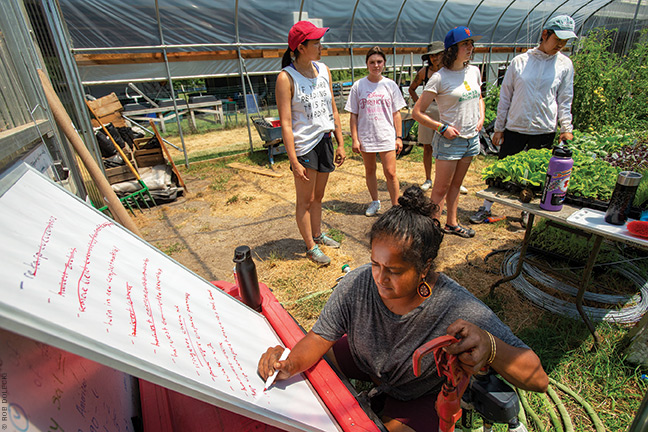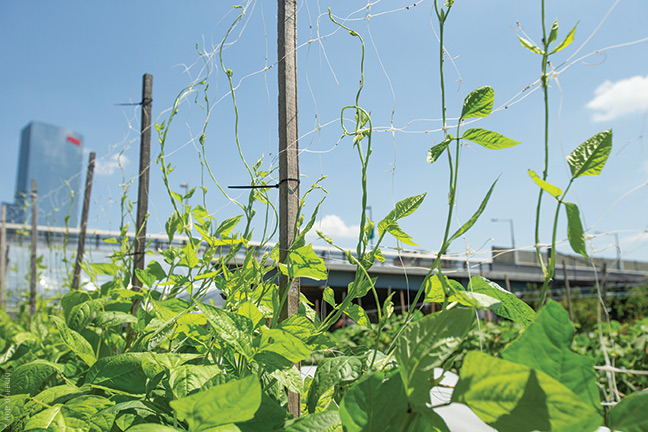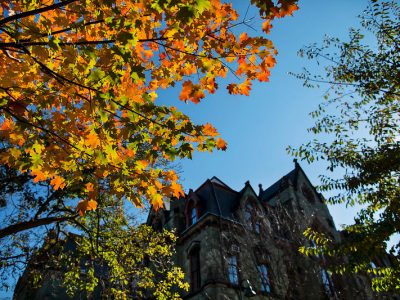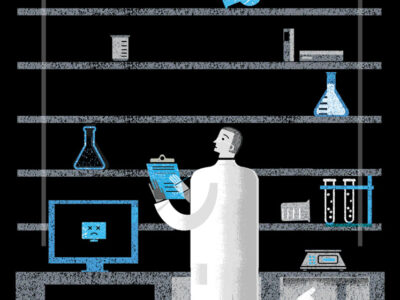
The Penn Park Farm is rooted in education, advocacy, and well-being.
The sun-drenched land is not more than a quarter acre in size. It lies between two sets of train tracks, and the rumble of a train often drowns out the sound of cars passing above it on the South Street Bridge. It is engulfed in the fragrance of fresh basil, with leaves as large as a hand, and the vibrance of orange cherry tomatoes, growing in sweet-tasting clumps along the trellises. There is zucchini, cucumber, squash, and eggplant; onion, garlic, shallot, and sweet pepper; collard greens, swiss chard, and bright sunflowers.
Welcome to Penn Park Farm. Located on the southern edge of Penn Park, its mission—to provide fresh produce to food-insecure members of the Penn community, while educating students and staff on food justice, food access, and sustainable agriculture—is as broad as the range of plants that grow in its rich, black soil.
The farm began with the “Your Big Idea in Wellness Challenge” from the Wellness at Penn office, in which members of the Penn community submitted wellness-related project proposals to win funding. One proposal came from Lila Bhide, who worked as a part-time employee with Penn Sustainability managing the Penn Garden, outside of Harrison College House. Bhide noticed that the Penn Garden, with its 12 raised beds, wasn’t large enough to accommodate the demand from Penn faculty to take a class to the space and gain hands-on experience outside the classroom.

Penn Park—with a working orchard on its perimeter, but a large swath of unused land on its southern edge—presented a solution, and Bhide created a proposal to turn the idle space into a working farm. She won the challenge in early 2020 and set out to hire a team and prepare an opening event that spring—just before the pandemic struck.
After a delay, Bhide and a small team returned to campus in the summer to build growing beds and till the soil, so that the farm could produce its first harvest that fall. The pandemic changed where the crops would go, as the initial target population—food-insecure students—were not on campus. Instead, the farm provided produce to food-insecure employees, including those facing straitened circumstances because of the pandemic. “I think it’s a great example of the kind of hands-on learning that we hope to do,” Bhide says, “because you learn about food insecurity theoretically in a classroom, but now you know how you coordinate transportation, develop relationships, and evaluate success.”
When students returned to campus in spring 2021, the farm went forward with its academic programming, inviting students and professors to learn about food insecurity and sustainable agriculture. “We’ve worked with so many departments—master’s in public health, master’s in education, anthropology, earth sciences, biology, [health and societies]—because food needs to be analyzed from so many perspectives to actually make change,” Bhide says.
To account for these myriad perspectives, the farm operates under a core of “four pillars.” These include education—through workshops, classes, and panels—as well as food access for students and staff, through programs such as the Netter Center’s Good Food Bag program, the West Philadelphia chapter of Food Not Bombs, and the HUP pantry. The farm also addresses the overall wellness of Penn community members, both through traditional well-being events—“We have yoga and workout classes at the farm, and we talk about the therapeutic benefits of getting outside and working with your hands,” Bhide says—and also through its food access program, by allowing food-insecure Penn students, with fresh produce in hand, to focus on their studies without worrying about where their next meal is coming from. The farm is also dedicated to sustainability, as it does not use chemical pesticides or herbicides, and uses restorative growing practices such as composting, mulching, raised beds, co-plantings, vertical growing, and low-till planting.
With this broad mission in place, the farm hopes to inspire a large swath of students to think more deeply about the impact of food on their communities and careers.
Em Fleshman C’21 began working at the farm as a student intern majoring in health and societies, and now works as a program coordinator, organizing volunteer events and student outreach. Such programs include a popular workshop on how to register for SNAP benefits, as well as tours of the farm given to high school classes. In addition, “we always do an event for Climate Week at Penn, and last year we talked about how agriculture can be a tool in fighting climate change, as opposed to a detriment,” Fleshman says. “There’s already so much land dedicated to agriculture and making that land grow more sustainably could be a huge help.”
For other students, like Gloria Cheng Nu’25 W’25, interning at the farm this past summer has fostered “a new appreciation for where I get my food. … I’ve been reconciling that disconnect between going to the grocery store and buying food and seeing where it comes from myself.” Dorothy Tan Nu’25 believes working on the farm will help her become a better advocate for her future patients. “It’s been exciting to gain a wider perspective on the growth, care, processing, and distribution of nutritious produce,” Tan says. “I’ve also learned a lot about the history and future of the food justice movement.”
And for Connie Pan C’25, the internship has brought together their lifelong interests in the environment and sustainable agriculture, while allowing them to “do things with my hands and my head” at a place with both an educational and practical mission. “We discuss what it is to be a farmer, and to have a relationship with land and plants and the food you eat,” Pan says. “We’ve done a lot of reading that brings this experience—hands in the dirt—to a more elevated level, which I think is probably the biggest thing I could have gotten from this experience.”
Bhide notes that this hands-and-brain ethos lies at the heart of her work at the farm. “We’re hoping to create this best-of-both-worlds environment, where students get all these amazing benefits of being in a vibrant city like Philadelphia, and can also connect with nature,” she says. “I think we try to be really intentional about emphasizing the wider context of Philly, and the history, and thinking about the systemic ways the lack of access to food is created.”
Ultimately, says Bhide, “I don’t like doing the farming and the justice work without the other: it can be difficult to learn about how deeply flawed the food system is without having an outlet to do something about it.”
—Daphne Glatter C’25




